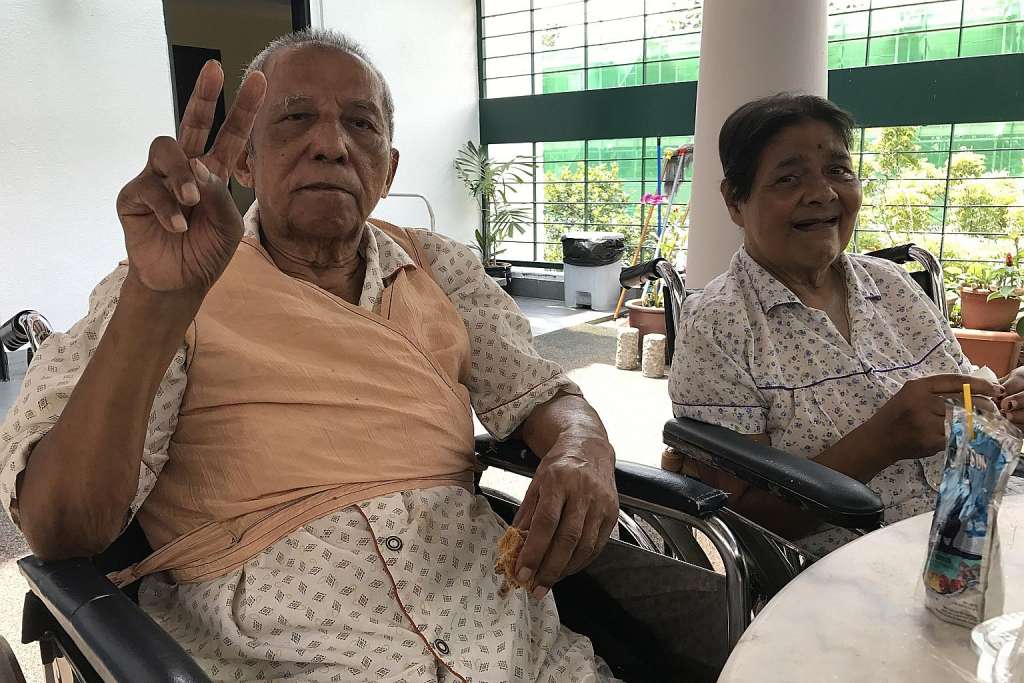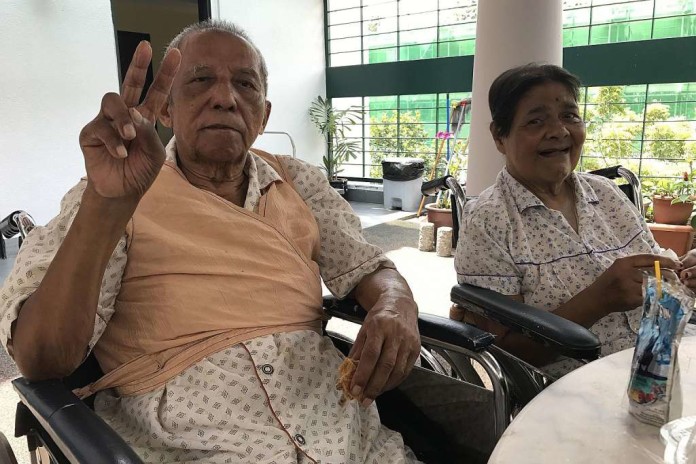They have been married for 54 years but were forced to live apart for 11/2 years in different nursing homes due to a lack of beds.
When the once inseparable couple was finally reunited under one roof late last year, the wife’s dementia condition had deteriorated to such an extent that she could not recognise her own husband.
“She told him: ‘This is not my husband’ and rejected him,” said their daughter, Madam Zaleha Abu, 45. “My dad, who was initially very excited to finally meet her, became quiet. It was heartbreaking and my father wept frequently after that,” she added.
Cases such as this raise the issue of whether the shortage of nursing home beds here means that elderly couples who need such services have to spend their golden years apart. In some cases, the separation may be even more acutely felt if one of them has dementia.
The authorities said no priority is given to a person who wishes to enter the same nursing home that the spouse is in, unless the senior citizen’s physical or mental well-being is dependent on both of them being under one roof.
Applications for a bed are processed on a first-come-first-served basis and only those with urgent care needs may get to jump the queue.
A similar story that caught global attention unfolded in Canada in August this year. An elderly man and woman, who have been married for 62 years, were placed in separate nursing homes for the better part of a year due to a backlog in the healthcare system.
Every other day, a family member would drive for 40 minutes to bring one of them to the other so they could spend time together. Every time the husband and wife said goodbye, there were tears.
Their granddaughter pleaded with the community to help speed up the move as her grandfather had dementia. The family feared his memory of his wife would fade faster the longer they were apart. The couple were reunited in September.
Madam Zaleha’s mother, Madam Nashua Adam, 74, was first placed in an Orange Valley nursing home in Marsiling in late 2013 when her dementia worsened.
The family had initially wanted to put her in a cheaper, charity-run nursing home with dementia care services in the north that provided halal food. There were no vacancies and she was placed on an interim scheme at Orange Valley, a private nursing home, until there was a bed elsewhere that would better meet her needs.
Meanwhile, Madam Zaleha cared for her father, Mr Abu Salleh, 80, at home. Mr Abu, who also has dementia, went for dementia daycare services at Sunshine Welfare Action Mission (Swami) home along Sembawang Walk.
Visiting her mother and caring for her father at home took a toll on Madam Zaleha’s health and she developed depression, she said.
So, she applied for a nursing home place for her father and the Agency for Integrated Care (AIC), which oversees nursing home placements, expedited the case because she also had an eye condition that required an operation.
Mr Abu got a place at Swami nursing home in mid-2014. Madam Zaleha then requested for her mother to be transferred to Swami.
The elderly couple always preferred to do things together, so Madam Zaleha thought it would do them good to live together at Swami. But there was no vacancy for female residents at Swami and she said she was told that the expected waiting time was three months to a year.
When one year was up, Madam Zaleha contacted Swami and AIC regarding the move, but she was informed that there was still no vacancy.
In the meantime, she shuttled to and fro between both nursing homes and brought her mother to visit her father once a month. But as time passed, Madam Zaleha grew increasingly anxious.
In August last year, she went to a Meet-the-People session and approached Nee Soon grassroots leaders for help. Her mother managed to get into Swami a few months later in November that year when a bed became available.
Nurses in Swami make it a point to arrange for the married couple to be together every lunch and tea time, as well as during certain exercise sessions or activities.
But after the elderly couple were reunited in Swami, the nurses do not refer to Mr Abu as Madam Nashua’s husband. This is because she now recognises him only as a good friend and gets agitated whenever he touches her, for instance.
The husband and wife also live in separate rooms as nursing home policy in Singapore stipulates separate accommodation for residents of different gender.
The wife sleeps in a 15-bedded room while the husband is in a double-bedded room down the corridor.
Said Madam Zaleha of her parents’ case: “I understand that their dementia condition may have deteriorated similarly even if they were not separated. But if the application for a spouse to join another in the same nursing home were given priority, and if the waiting list had not been so long, perhaps my parents could have spent more lucid moments together.”
She added that while the authorities do face constraints, “they need to bend the rules on a case- by-case basis, even if they can’t break all rules”.
For now, Mr Abu is content with just keeping his wife within sight.
“I prefer to have her in the same room so that if anything happens to me, she will know,” he said. However, he added: “But as long as I can see my wife, it is all right.”
Seniors may have to wait months for bed in subsidised home
Senior citizens hoping to get a subsidised nursing home place can expect to wait a few months.
Applications for a bed are processed on a first-come-first- served basis and priority is given only to those with urgent care needs, said the Ministry of Health (MOH) and the Agency for Integrated Care (AIC), which oversees nursing home placement.
This means that a spouse who wishes to join his or her other half who is already in a particular nursing home will be assessed as any other individual application.
However, if the senior citizen’s physical or mental wellbeing is dependent on the married couple being under one roof, AIC will try to expedite the process. But this depends on the availability of beds.
There are about 12,000 nursing home beds, and the plan is to have 17,000 in four years’ time.
MOH and AIC declined to release specific details on the waiting time for a bed now and would only say that patients may wait for “a few months”.
With Singapore’s ageing population, waiting times may have gone up. The Straits Times reported in 2010 that the average waiting time for a state-subsidised nursing home bed, for instance, rose from roughly 50 days in 2008 to 60 days in 2010.
In assessing the urgency of a nursing home application and placement, an AIC spokesman said it considers a range of factors, such as the care needs of the person, the safety of the person at home, the availability of other care alternatives and the caregiver’s ability to care. “This is then compared against the availability of nursing home beds.”
Experts said the backlog in bed capacity is partly due to the residents’ length of stay, which ranges from months to years. Some need to be at nursing homes because of heavy nursing needs, but many others are there because there is no one to care for them at home.
Once an elderly spouse gets a place in the home, nursing home licensing requirements also stipulate that residents of different genders need to have separate accommodation because of privacy and modesty issues.
But AIC and MOH said they allow operators the flexibility to manage the living arrangements of married couples. “Whether couples can be housed in the same nursing home room depends on whether the nursing home is able to offer such an option,” they said.
“Nursing home operators have facilitated requests from couples to be housed in the same room where possible, or to house a couple in rooms that are in closer proximity with each other. There have also been instances where couples do not want to share the same room.”
Given the expected demand for dementia care as well as nursing home services that come with an ageing population, MOH said “it is important for (the ministry) to continue to focus on expanding the capacity of aged care services”.
jantai@sph.com.sg
Read also: 10,000 more healthcare workers needed in next 3 years
Growing old: Should you be worried?
‘I’d rather die than go to a home’

This article was first published on Nov 06, 2016.
Get a copy of The Straits Times or go to straitstimes.com for more stories.







